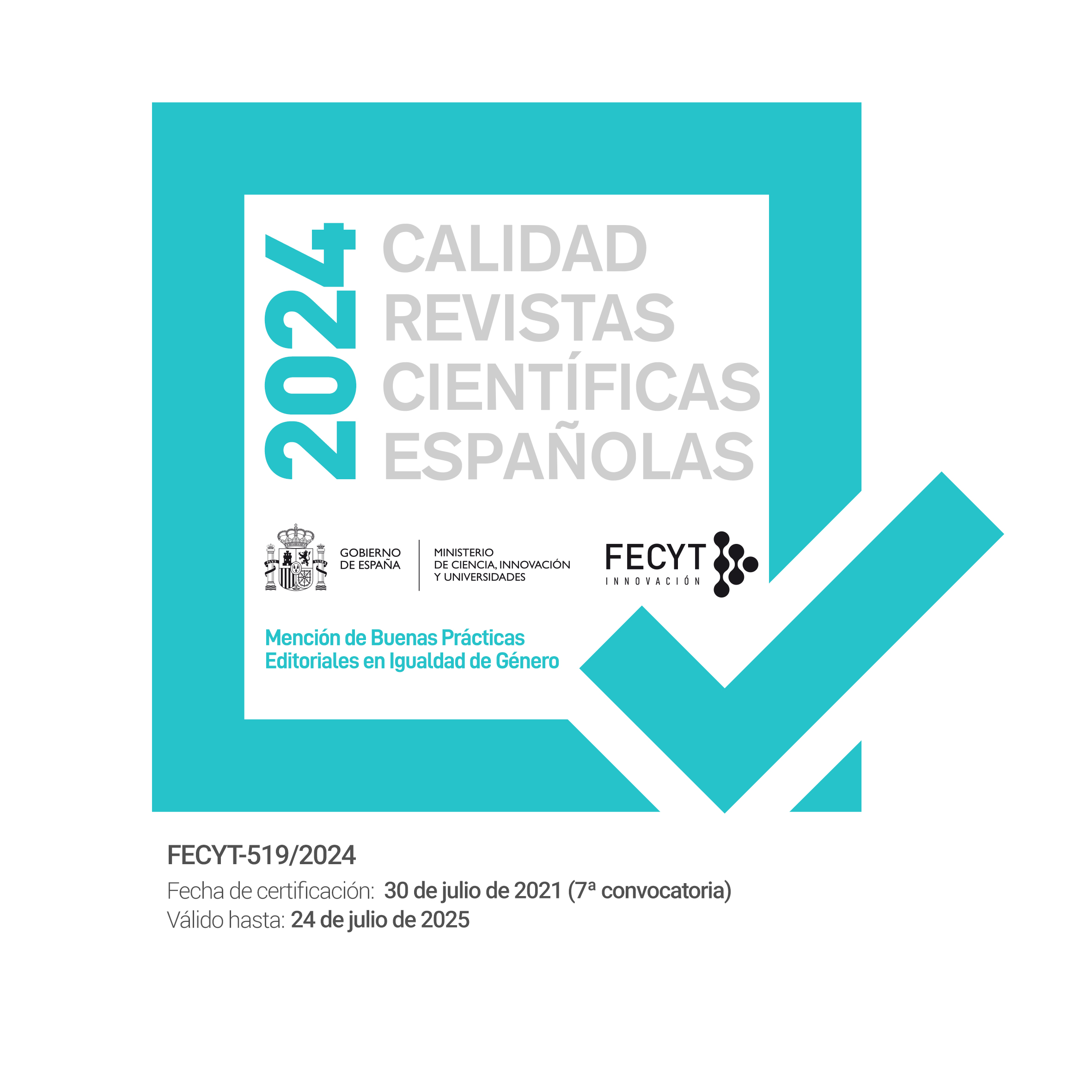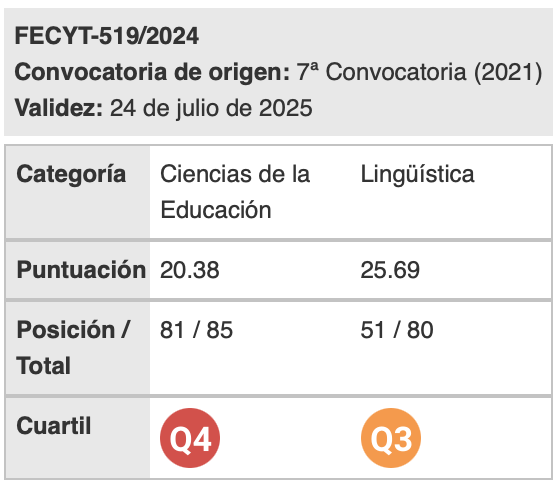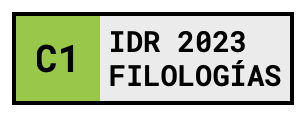Metaphor as a device for understanding cognitive concepts
Palabras clave:
metaphor, metaphorization process, image schemes, heuristic potential, conceptual sphere, meaning representation, cognitive model, military conceptual sphereResumen
The paper addresses metaphor as a cognitive-semantic device which is able to reveal intuitive mechanisms of the thinking process, thus filling the gaps in the sphere of logically objective human knowledge and opening the possibility to describe abstract concepts of the human mind in terms. This paper substantiates the principal possibility of conceptual modeling of the metaphorization process and describes its baseline algorithm, identifies complex metaphors and establishes the cognitive-semantic features of their functioning. The main conclusion of the reasoning confirms the hypothesis that different image schemes have different strength of heuristic potential, which determines the fullness of metaphorical descriptions of concepts.Descargas
Citas
Arnold, I. V. (2002). Stylistics. Modern English. Moscow: Flinta, Nauka.
Arutyunova, N. D. (1990). Metafora I diskurs [Metaphor and discourse]. In N. D. Arutyunova (Ed.), Teoriya metafory [Theory of metaphor] (pp. 5-33). Moscow: Progress.
Arutyunova, N. D. (1998). Yazyk imircheloveka [The language and the world of human]. Moscow: Yazyki russkoi kul'tury Publ.
Arkhipov, I. K. (1997). O printsipah identifikacii perenosnyh znacheniy [On the principles of identification of the indirect meanings]. In StudiaLinguistica: Jazykovaja Sistema I sociokul'turnyj kontekst [Language system and socio-cultural context] (pp. 27-36). St. Petersburg: Trigon.
Black, M. (1990). Metafora [Metaphor]. In N.D. Arutyunova, & Zhurinskaya (Eds.), Teoriya metafory [The metaphor theory] (pp. 153-172). Moscow: Progress. M.A.
Boys-Stones, G.R. (Ed.) (2003). Metaphor, allegory and the classical tradition: Ancient thought and modern revisions. Oxford: Oxford University Press.
Fillmore, C.J. (1982). Frame semantics. In LiMed, Linguistics in the morning calm: Selected papers from the SICOL-1981 (pp. 110-137). Seoul: Hanship.
Gentner, D., & Gentner, D.R. (1982). Flowing waters or teeming crowds: Mental models of electricity. In D. Gentner & A.L. Stevens (Eds.), Mental Models (pp. 99-129). Hillsdale, N.J.: Erlbaum.
Holland, T.H., Holyoak R.J., Nisbett R.E. & Thagard P.K. (1986) Induction: Processes of inference, learning and discovery. Cambridge, Massachusetts: MIT Press.
Johnson-Laird, P.N. (2004). Mental models and reasoning. In J. P Leighter, & R. J. Sternberg (Eds.), The nature of reasoning (pp. 169-205). Cambridge: Cambridge University Press.
Kiseleva, S.V. (2009). Sushhnost' mnogoznachnogo slova v anglijskom jazyke [The Essence of polysemantic words in English]. St. Petersburg: Asterion.
Kubryakova, E.S. (2004.) Jazykiznanie: Na puti poluchenija znanij o jazyke: Chasti rechi s kognitivnoj tochki zrenija. Rol' jazyka v poznanii mira [Language and knowledge. On the way of learning about the language: Parts of speech from a cognitive point of view. The role of language in the knowledge of the world]. Moscow: Yazyki Slavyanskoy kultury Publ.
Lakoff, G. (1990). The Invariance Hypothesis: Is abstract reason based on image-schemes? Cognitive Linguistics 1(1), 39-74.
Lakoff, G. (2008). The neural theory of metaphor. In R. W. Gibbs (Ed.), The Cambridge handbook of metaphor and thought (pp. 17-38). Santa Cruz. N.Y.: Cambridge University Press.
Lakoff, G., & Johnson, M. (1980). Metaphors we live by. Chicago: University of Chicago Press.
Lakoff, G., & Johnson, M. (2004). Metafory, kotorymi my zhivem [Metaphors that we live by] Trans. from English. Moscow: Editorial URSS.
Lebedeva, S.V., & Zubkova O.S. (2011). Metafora kak lingvosemioticheskaja model: semiogenez I interakcional'nye vozmozhnosti [Metaphor as a linguosemiotical model: semiogenesis and interactional opportunities]. Voprosy kognitivnoy lingvistiki [Issues of cognitive linguistics] (pp. 112-120). Tambov: Tambov University Press. 3 (028).
McCormack, E. (1990). Kognitivnaya teoriya metafory [Cognitive theory of metaphor]. In N. D. Arutyunova (Ed.), Teoriya metafory [Theory of metaphor] (pp. 358-387). Moscow: Progress.
Miller, G.A. (1990). Obrazy i modeli, upodoblenija imetafory [Images and models, similes and metaphors]. In N.D. Arutyunova, & M.A. Zhurinskaya (Eds.), Teoriya metafory [The metaphor theory] (pp. 202-250). Moscow: Progress.
Minsky, M. (1980). A framework for representing knowledge. In D. Metzing (Ed.), Frame conceptions and text understanding (pp. 1-25). New York: Gruyter.
Nikitin, M.V. (2006). Kurs lingvisticheskoj semantiki [Course of linguistic semantics]. St. Petersburg: Herzen state pedagogical university after A.I. Herzen.
Pepper, S.S. (1979). World hypotheses. Berkeley: University of California.
Richards, A. (1990). Filosofija ritoriki [The Philosophy of Rhetoric]. In N.D. Arutyunova, & M.A Zhurinskaya (Eds.), Teoriya metafory [The metaphor theory] (pp. 44-68). Moscow: Progress.
Rosch, E., & Mervis C. (1975). Family resemblance: Studies in the internal structure of categories. Cognitive Psychology 7, 573-605.
Rosenblatt, P.C. (1994). Metaphors of family systems theory. Toward new constructions. New York, London: The Guilford Press.
Schank, R.C. (1982). Dynamic memory. A theory of reminding and learning in computers and people. Cambridge: Cambridge University Press.
Searle, J.R. (1990). Metaphor. In A.P. Martinich (Ed.), The Philosophy of Language (pp.408-429). Oxford: Oxford University Press.
Semino, E., & Culpeper, J. (Eds.) (2002). Cognitive stylistics. Language and cognition in text analysis. Amsterdam: John Benjamins.
Scott, W.A., Osgood D.W., & Peterson, C. (1979). Cognitive structure, theory and measurement of individual differences. Washington: V.H. Winston.
Turner, M., & Fauconnier, G. (1995). Conceptual integration and formal expression. Journal of Metaphor and Symbolic Activity, 10(3), 183-204.
Sources and authorized abbreviations
CDQ – The Concise Dictionary of Quotations edited by Angela Partington. The Oxford University Press, 1993.
DSUE – A Dictionary of Slang and Unconventional English, Ed. by Partridge E. London, 1937.
EGM – English Guides Metaphor, «Collins Cobild» series. Дейнан Э. Метафоры: Справочник по английскому языку. М.: АСТ; Астрель, 2003.
LDCE – Longman Dictionary of Contemporary English. London: Longman, 1995.
MED – Macmillan English dictionary for advanced learners. Second edition, Oxford, 2007.
OED - The Oxford English Dictionary. Oxford University: Clerendon Press, 1989. - Vol. 3. p.1078
Brook, P. (1998). Threads of time. Recollections. Washington: A Cornelia and Michael Bessie Book.
Carnegie, D. (1998). How to stop worrying and start living. New York: Simon and Schuster.
Cavell, R. (2007). McLuhan in space. A cultural geography. Toronto: Toronto University Press.
De Risio, S. (2004). Bioethics in complexity. Foundations and evolutions. London: Imperial College Press.
Prinz, J. J. (2002). Furnishing the mind. Concepts and their perceptual basis. Massachusetts Institute of technology: MIT Press.
Spencer, L. V. (1990). Morning glory. New York: Jove Books.
Descargas
Publicado
Cómo citar
Número
Sección
Licencia
Aquellos autores/as que tengan publicaciones con esta revista, aceptan los términos siguientes:
- Los autores/as conservarán sus derechos de autor y garantizarán a la revista el derecho de primera publicación de su obra, el cuál estará simultáneamente sujeto a la Licencia de reconocimiento de Creative Commons que permite a terceros compartir la obra siempre que se indique su autor y su primera publicación esta revista.
- Los autores/as podrán adoptar otros acuerdos de licencia no exclusiva de distribución de la versión de la obra publicada (p. ej.: depositarla en un archivo telemático institucional o publicarla en un volumen monográfico) siempre que se indique la publicación inicial en esta revista.
- Se permite y recomienda a los autores/as difundir su obra a través de Internet (p. ej.: en archivos telemáticos institucionales o en su página web) antes y durante el proceso de envío, lo cual puede producir intercambios interesantes y aumentar las citas de la obra publicada. (Véase El efecto del acceso abierto).

Revista de Lenguas para fines específicos is licensed under a Creative Commons Reconocimiento-NoComercial-SinObraDerivada 4.0 Internacional License.






















